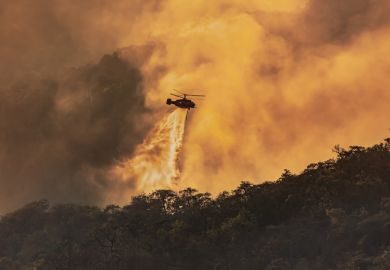Why Geography Matters provides a number of discussions of contemporary political and social issues, but these are only loosely connected. Aside from the three challenges of the subtitle, there are discussions of European Union, the interrelation of humans and environment, the challenges of population growth, and the contemporary problems and opportunities for Russia and Africa.
The book opens with two chapters of a more general nature. The first carries the same title as the book and is an impassioned plea for a greater geographical awareness on the part of policymakers and the wider public. The second is a useful account of how maps can be read and misread as well as being wilfully deceptive.
While the personal style may be in keeping with someone with Harm de Blij's profile in the US - he was geography editor on ABC's television breakfast show Good Morning, America - it seems rather out of place outside.
Nonetheless he clearly has a topic of importance. The "challenges" facing America certainly have geographical dimensions, and accounts of these aspects should be part of any nuanced account of their complexities.
De Blij is undoubtedly correct in claiming that the level of geographical knowledge informing much of the responses can leave much to be desired. But the specificity of what his account offers beyond other discussions available is lacking. With such a diverse range of themes - this is in effect a primer on contemporary world politics from a geographical perspective - the weight placed on the introductory material is considerable.
De Blij needs to offer an account of what geography can provide in terms of a conceptual frame and unifying focus. He notes that while history, geology and biology have a widely recognised focus, geography does not, encompassing a wide range of different subject areas. And yet his account of geography as a spatial perspective on the world, while fine as far as it goes and one that many geographers would willingly embrace, is undeveloped.
The understanding of history as concerned with temporality and geography as spatiality is simply inadequate, and to emphasise the spatial at the expense of the temporal is to swing too far the other way. This becomes most banal with the call for presidential geographers as well as historians. Although geographers certainly can have interesting things to say about that office, I find it hard to believe that, in de Blij's terms and with his example, it is as important where President Richard Nixon was when he learnt certain details about the Watergate scandal as when he heard them.
The audience for this book is clearly intended to be predominantly American. De Blij makes valid points when he bemoans the loss of US geography departments and the lack of world knowledge that the US educational system gives to its graduates. But all too often his accounts are not much more than informed journalism peppered with maps and places.
I find it hard to see what interest there will be in this book outside the US. While its engaging writing style lends it to classroom use, the reliability of its accounts and meagre referencing makes it a problematic source. The maps are generally good, but on occasion textual nuances are not carried over graphically. Some are particularly striking - the coterminous juxtaposition of the US with China to the same scale and at the same latitude is an especially good example. At times though, protestations to the contrary notwithstanding, his suggestions come very close to geographical determinism. There is a tendency to reduce complexities to geographical location, as if mapping a problem is the solution in itself rather than a tool towards it. The criticism of Samuel Huntingdon's Clash of Civilisations seems basically to be that geographical textbooks had been predicting this for some years and that Huntingdon merely popularised it.
If this is the impact of a geographical perspective, perhaps we are better off without its simplicity, or perhaps its complicity. The lack of geographical knowledge is, de Blij suggests, a threat to US national security. While that can be read in more ways than one, the appropriation of "security" as a justification for other goals should give cause for caution. Geography in the service of any one nation seems to be a return to its imperial origins or the appropriations of geopolitics in the first half of the 20th century.
Geography can tell us much about difference, but also about the shared nature of problems on the globe as a whole. That unifying drive is at risk in partial accounts such as this.
Stuart Elden is a reader in political geography and the academic director of the International Boundaries Research Unit at Durham University.
Why Geography Matters: Three Challenges Facing America -JClimate Change, the Rise of China, and Global Terrorism
Author - Harm de Blij
Publisher - Oxford University Press
Pages - 308
Price - £15.99 and £9.99
ISBN - 0 19 518301 6and 31582 0
Register to continue
Why register?
- Registration is free and only takes a moment
- Once registered, you can read 3 articles a month
- Sign up for our newsletter
Subscribe
Or subscribe for unlimited access to:
- Unlimited access to news, views, insights & reviews
- Digital editions
- Digital access to THE’s university and college rankings analysis
Already registered or a current subscriber? Login



